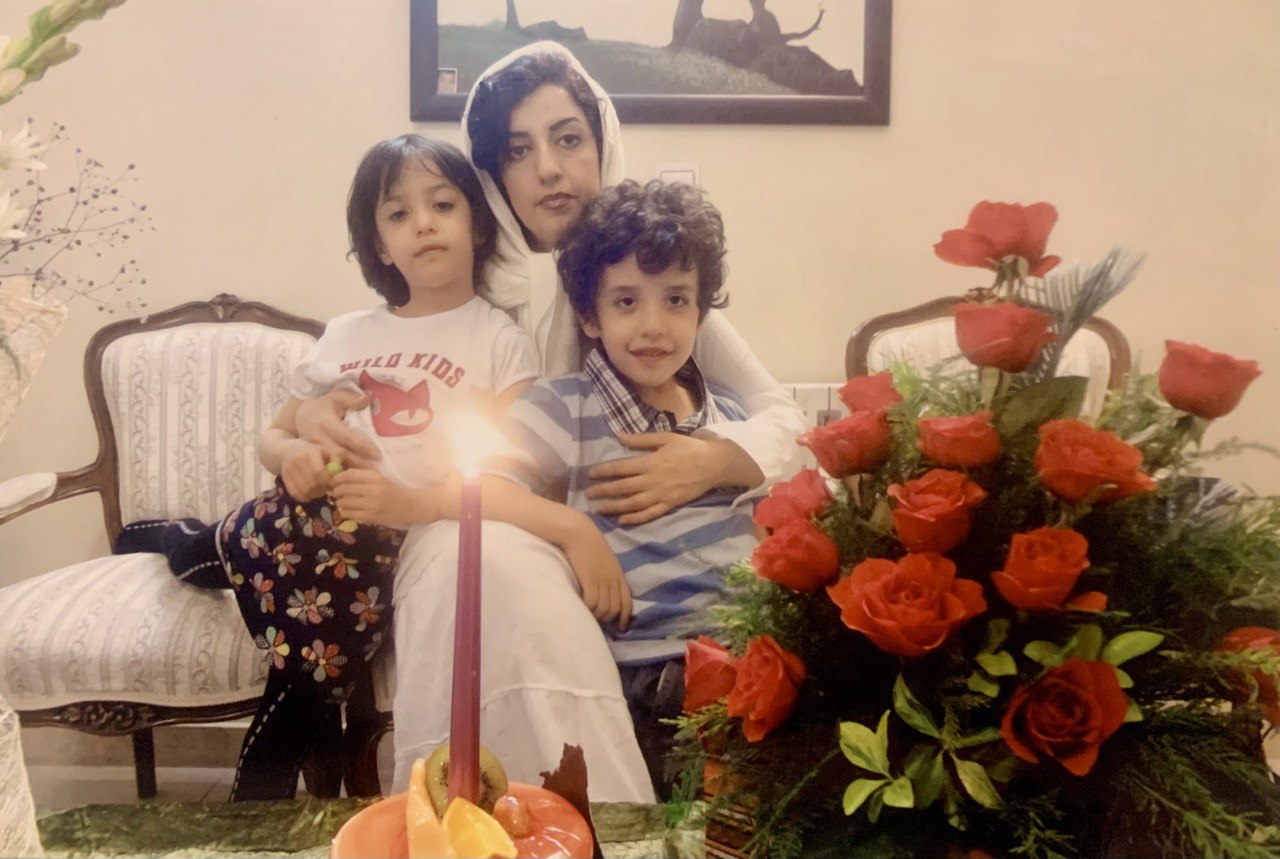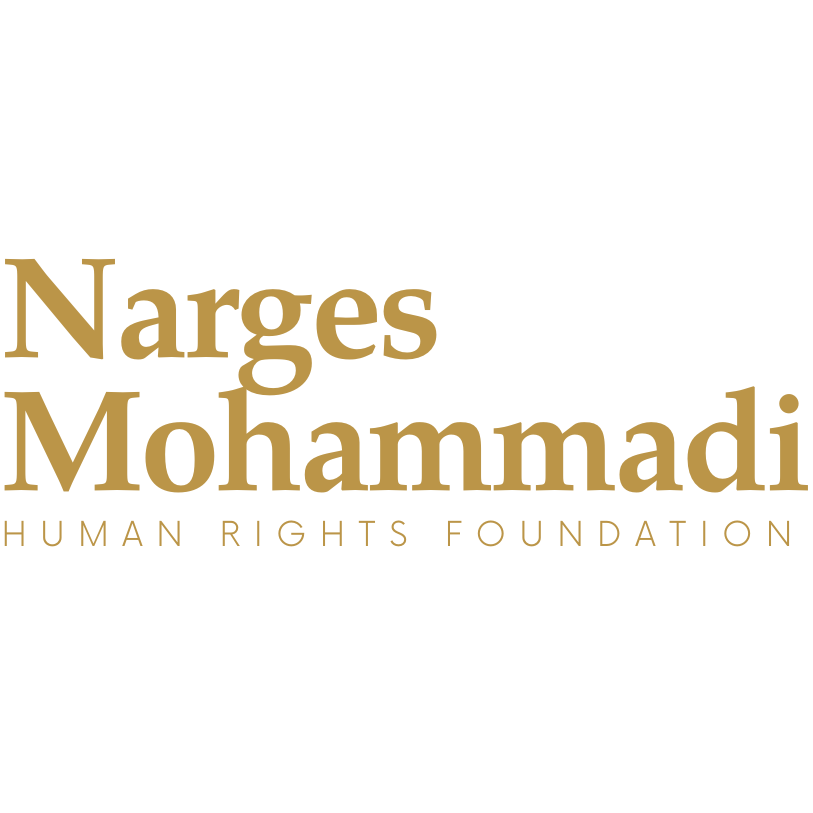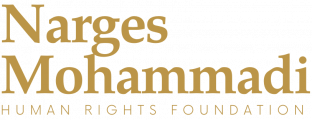
Narges Mohammadi on the 10th Year of Separation from Her Twin Children
In the arena of struggle, resistance, and life, the imprisoned mother is a symbol of “defiance.”
On the morning of July 16th, 2015, within the walls of unending suffering, on the bottom bunk in room two, in the women’s political ward of Evin Prison in Tehran, I stayed awake through the night with open eyes, gazing into the depths of the colorless galaxy. My heart pounded intensely like the eruption of volcanic lava, and my hands were as cold as the winter chill of the mountains. I stared at the iron ceiling of the bunk bed that confined my vision to a meter.
At 5 AM, the plane would take off, and my 8-year-old twins, Kiana and Ali, would be taken from me for an ‘unknown’ period of time. A separation that meant no embracing, no touching, no seeing, and not even hearing their voices. It felt like vanishing into a misty void of lost connections, tearing a mother and her children apart, leaving us in an indescribable abyss of heartache and longing.
A separation that would make me ‘a stranger’ to my children and them ‘unfamiliar’ to me.
A separation that would turn me into an unfamiliar woman to my children, bearing the name ‘mother’ in a ‘misplaced’ manner.
Yes, misplaced… in a place called Iran in the Middle East—a place where war and tyranny go hand in hand.
Mothers of soldiers sent to the battlefields of war and massacre…
Mothers of terrified children fearing relentless bombs, Mothers of youths buried under tons of soil,
Bleeding in streets by bullets from guards,
Their heads hung on ropes in prisons…
Mothers of girls torn and killed for the beauty of their hair, Gravestones placed upon their chests, burdened with despair.
Mothers of those imprisoned and confined in cells of horror and torture, Enduring endless pain, their spirits strong, their hearts endure. Who have risen for freedom and equality’s true aim,
These mothers, in the Middle East, in Iran, Clutch their chests in anguish, bearing their grief and pain.
The imprisoned mother epitomizes the essence and symbol of ‘defiance.’ She defies the commands of a tyrannical government, the shallow definitions of the times, the traditions that prioritize religious and paternal dominance, and the predetermined familial roles designed for subjugation.
The imprisoned mother is a powerful symbol of being “misplaced” in the realm of defiance.
She signifies suffering that imparts meaning, rather than sanctity, to adversity.
She embodies the enduring rhythm of struggle, perseverance, and life.
Like many other imprisoned mothers, I have risen in defiance against the Islamic Republic regime—a regime that, under the guise of religion and patriarchy, has sought to establish rule by one gender…& Now, has become a republic of demons, where the demon of oppression, discrimination, and tyranny reigns over this land.
The protesting and fighting women and mothers of Iran are determined to show that oppression, domination, and discrimination will not be tolerated, steadfastly standing on the front lines.
I hope my children understand that I, like all imprisoned mothers, although being a “mis-placed” and “defiant,” was a loving mother whose heart still aches with overwhelming sorrow for her children.
Narges Mohammadi
Evin Prison – Tehran
16th July 2024
“On July 16, 2015, Narges Mohammadi’s children were compelled to leave Iran due to safety concerns. Prior to this, their father had been forced to leave earlier when secret agents attempted to re-arrest him after 14 years of imprisonment, while Narges, their mother, remained incarcerated. With both parents absent, continuing to reside in Iran became exceedingly challenging for them, leaving them no option but to depart the country. Since their departure at the age of 8 in 2015, Narges has not yet seen her children again.”
Narges Foundation Media
نرگس محمدی در دهمین سال رفتن کیانا و علی از ایران:
در میدان مبارزه، مقاومت و زندگی، مادرِ زندانی نماد و نشان “سرپیچی” است.
صبحگاه بیست و ششم تیر در سال ۹۴ در اقامتگاه رنجهای التیامناپذیر، در طبقه یکِ تخت اتاق دو، در بند زنان سیاسی ـ عقیدتی اوین، شب را با چشمانِ باز تا انتهای مرزِ بیرنگِ کهکشان، قلبی پرتپش به شدت جهیدن گدازههای آتشفشان و دستانی سرد به برودتِ زمستانِ کوهستان به سقفِ آهنی تخت که شعاع دیدنِ مرا در یک متری ”حد” میزد، خیره مانده بودم.
ساعت ۵ صبح هواپیما بلند خواهد شد و کیانا و علیِ کوچک مرا برای زمانی “نامعلوم” از من دور خواهد کرد. دوریای به معنای به آغوش نکشیدن، لمس نکردن، ندیدن و حتی صدایشان را نشنیدن. شبیه محو شدن در فضای مهآلود گمگشتگی نشانهها که مادر و فرزند را در موقعیت وصفناپذیری رها خواهد کرد.
دوریای که مرا برای آنها “غریبه” و آنها را برای من “ناآشنا” خواهد کرد.
دوریای که مرا، زنِ ناآشنایی خواهد ساخت که نامش “مادر” است. نامی “نا به جا”. “جا”؟
جایی به نام ایران در جایی به نام خاورمیانه.
جایی که جنگ و استبداد شانه به شانهی هم میتازند. مادرانِ سربازان که به سوی میدان جنگ و کشتار روانه میشوند، مادرانِ کودکانِ وحشتزده که از بمبهای بیامان میهراسند، مادرانِ جوانانِ زیر خروارها خاک پنهانشده که در خیابانها با گلولههای پاسدارانِ ضد امنیت در خون می غلطند و در زندانها سرهایشان را بر طناب دار می آویزند ، مادرانِ دخترانِ دریده و کشته شده که برای زیبایی موهای سیاه شرقیشان سنگِ قبر را بر روی سینههایشان می نشانند، مادرانِ زندانی و محبوس در سلولهای وحشت و شکنجه و بعد زندانهای پایان ناپذیر که برای آرمان آزادی و برابری به پا خاستهاند، مادرانِ “این جا”؛ خاورمیانه و “این جا”؛ ایران، بر زهدان و سینههایشان چنگ میزنند.
در این میان مادرِ زندانی، عنصر و نمادِ “سرپیچی” است. سرپیچی از فرمان حکومت استبدادی، سرپیچی از تعاریف خالی از معنای رایج زمانه، سرپیچی از سنت برگرفته از سالار کردن دین و سالار کردن پدر، سرپیچی از نشستن در جایگاه تعیین شده در خانواده با معیارهای ارزشگذاری شده برای سلطهپذیری و …
مادرِ زندانی، “نا به جا“یی پرقدرت در میدان سرپیچی است.
مادرِ زندانی، رنج نشانی است که رنج را نه تقدس که معنا میبخشد.
مادرِ زندانی، آهنگ مبارزه، ایستادگی و زندگی است.
من چون هزاران مادرِ زندانی، در این جا سر بر کشیدهام برای سرپیچی از حکومت جمهوری اسلامی که به نام دینسالاری، سودای سالار کردن دین و با پدرسالاری، سودای سالار کردن یک جنسیت را در سر داشت و اکنون به دیوسالاری نائل شده و دیو ستم، سلطه، تبعیض و استبداد را سالار کردهاست. خوش آنکه زنان و مادرانِ معترض و مبارز بنا دارند نشان دهند که ستم، سلطه و تبعیض بر ما روا نیست و استوار در خط مقدم ایستاده اند.
امید دارم کودکانم بدانند من نیز چون همهی مادرانِ زندانی گرچه یک “نا به جا” و نشاندار “سرپیچی”، اما مادری عاشق بودم که موج سهمگین حسرت کودکانش همچنان بر قلبش می کوبد.
نرگس محمدی
زنداناوین
تیر ۱۴۰۳
Narges Mohammadi à l’occasion du dixième anniversaire du départ de Kiana et Ali d’Iran :
Dans l’arène de la lutte, de la résistance et pour la vie, toute mère emprisonnée est un symbole de défiance.
Le 16 juillet 2015, au matin, dans un lieu sinistre où les souffrances sont indicibles, au premier niveau du lit de la chambre numéro deux du quartier des femmes prisonnières politiques et idéologiques d’Evin, j’ai veillé toute la nuit, ne parvenant pas à fermer l’œil. Mon cœur battait intensément comme l’éruption des laves volcaniques tandis que mes froides étaient froides comme le froid hivernal des montagnes. Je fixais le plafond de fer de mon lit qui limitait mon champ de vision à un mètre.
À 5 heures du matin, l’avion décollerait, emmenant mes petits Kiana et Ali loin de moi pour une période “indéterminée”. Une séparation qui signifiait que je ne pourrai plus les serrer dans mes bras, ne plus les toucher, ne plus les voir et ne plus entendre leurs voix. Une séparation qui signifiait que j’allais disparaître dans un espace brumeux, que j’allais être suspendue à des signes aléatoires. Une séparation laissant mère et enfant dans une situation indescriptible.
Une séparation qui me rendrait « étrangère » à leurs yeux. Une séparation qui ferait d’eux des « inconnus » pour moi.
Une séparation qui ferait de moi une femme lointaine dont il ne restera, en guise de maternité, que l’appellation de “mère”. Ce mot, « mère » est-il encore adéquat ?
Une femme lointaine, demeurée en son pays, l’Iran, au Moyen-Orient.
Un endroit où la guerre et la tyrannie cheminent ensemble. Les mères des soldats envoyés sur les champs de bataille, là où se commettent les massacres dans le monde, les mères des enfants terrifiés qui craignent les bombes incessantes, les mères des jeunes cachés sous des amas de terre qui sont abattus de sang-froid ou blessés, dans les rues, par les forces de sécurité qui pendent leurs enfants dans les prisons, les mères des filles traquées et tuées pour la beauté de leurs cheveux noirs orientaux, dont les poitrines seront ensevelies par leur pierre tombale, les mères des prisonniers parqués dans des cellules de terreur et de torture puis dans des prisons éternelles qui se sont levés pour les idéaux de liberté et d’égalité. Ici, au Moyen-Orient et en Iran, les mères se frappent constamment la poitrine.
Parmi ces mères, la mère emprisonnée est l’élément et le symbole de la défiance par excellence.
La résistance contre les ordres d’un gouvernement tyrannique, la résistance face aux définitions communes dénuées de sens de l’époque, la résistance contre la tradition réactionnaire dérivée de l’ordre religieux et patriarcal, la résistance contre le déterminisme, la domination et la soumission des femmes dans la société, dans le foyer et dans la famille.
La mère emprisonnée est une figure puissante de résistance mais une figure “mal perçue”.
La mère emprisonnée est un signe de souffrance, certes une souffrance qui a du sens, mais ce n’est pas une figure martyre, ce n’est pas non plus une figure de sainteté.
La mère emprisonnée est le symbole de la lutte, de la persévérance et de la vie.
A l’instar de milliers de mères emprisonnées, je me suis levée ici pour défier le gouvernement de la République islamique, qui, au nom de la théocratie, visait à imposer, par l’ordre religieux et patriarcal tyrannique, la domination et l’oppression d’un genre sur l’autre. Fort heureusement, les femmes et les mères protestataires et combattantes ont été, de tout temps, et encore aujourd’hui, résolues à se battre, en première-ligne, contre l’oppression, la domination et la discrimination.
J’espère que mes enfants comprennent mon combat, à l’instar de celui de toutes les mères résistantes J’espère qu’ils se souviendront toujours que je suis une mère aimante dont le cœur bat grevé de l’immense chagrin d’être séparé d’eux.
Narges Mohammadi
Prison d’Evin
16th July 2024


